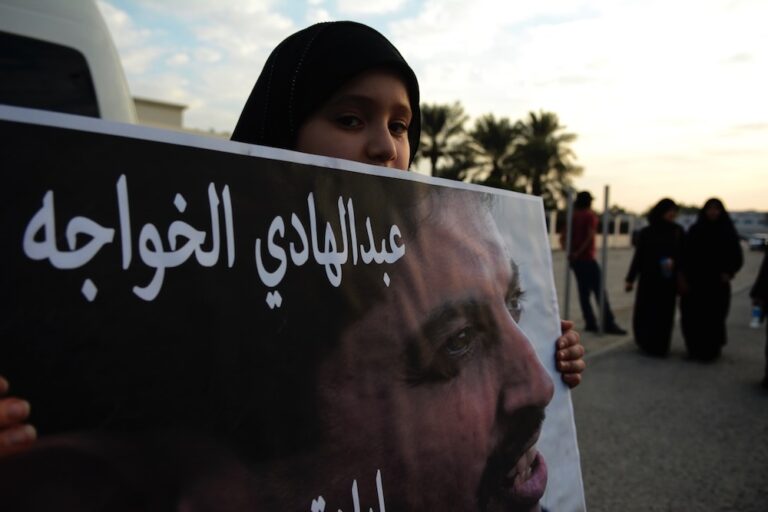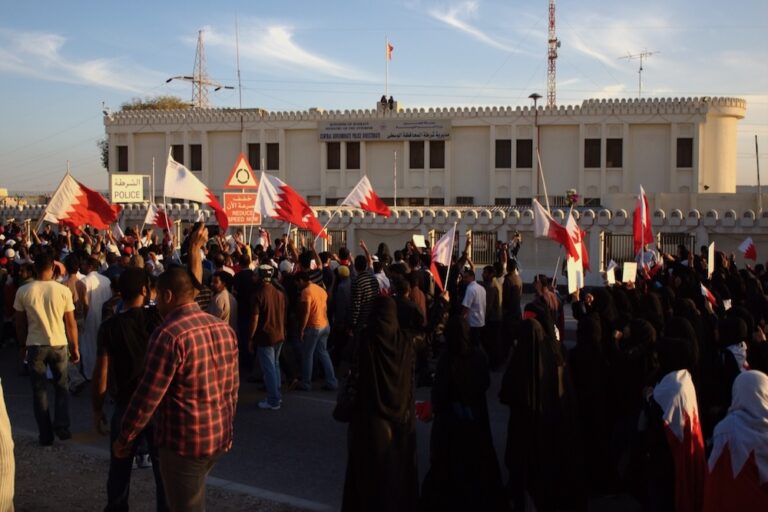Bahraini human rights defenders Abdulhadi Al Khawaja and his daughter Zainab Al Khawaja are on hunger strike in protest at being denied visits from their family. Zainab has been striking since 17 March 2013.
Bahraini human rights defenders Abdulhadi Al Khawaja and his daughter Zainab Al Khawaja are on hunger strike in protest at being denied visits from their family. Zainab has been striking since 17 March 2013. The Bahrain Center for Human Rights (BCHR) has been monitoring their health and providing updates:
24 March 2013
Both Abdulhadi Al Khawaja and his daughter Zainab were denied family visits again this weekend, prompting them to start a dry hunger strike today [in which the striker refuses both food and water].
Zainab Al Khawaja was told by doctors that she is at risk of organ failure, cardiac arrest or coma at any time. Her blood sugar has dropped steeply on several occasions in the last two days.
“Zainab is reportedly having severe hypoglycemia with HGT measurements reaching 2. Her family reported that she sounded fatigued, said she was suffering loss of memory and concentration. Having initiated a dry hunger strike now, including no intake of glucose, she is at high risk of the sudden onset of arrhythmias, loss of consciousness and possibly death especially that she is in a detention center were no cardiac monitor or cardiac resuscitation service is available,” said Dr. Fatima Haji, Internal Medicine Specialist.
21 March 2013
BCHR has received information that Abdulhadi Al Khawaja’s health continues to deteriorate. Prison officials refuse to take him to the hospital for treatment because he refuses to wear the prison uniform. Al Khawaja is a prisoner of conscience; he has thus far not been required to wear the prison uniform, as is standard for criminal prisoners.
BCHR would remind the prison authorities that, as Bahrain is a signatory to the International Covenant on Civil and Political Rights, they are required to treat all prisoners with humanity and respect. This includes providing medical attention to persons in need, regardless of whether they are wearing a prison uniform or not.
BCHR holds the prison authorities solely responsible for the deteriorating health of Abdulhadi Al Khawaja, and demands an immediate investigation into the allegations that his health is being held hostage because of his decision to refuse a prison uniform.
Zainab Al Khawaja’s hunger strike continues.
20 March 2013
BCHR has received information that Zainab Al Khawaja was taken to the hospital and received glucose in order to bring her blood-sugar levels back to normal. Her hunger strike continues.
BCHR has also received information that Abdulhadi Al Khawaja has started to drink water. His hunger strike continues.
18 March 2013
According to BCHR, Zainab Al-Khawaja’s mother received a phone call today from the prison her daughter is being held in notifying her that Zainab’s health had deteriorated, and that she refuses to be taken to the hospital until she is allowed to see her daughter.
BCHR expresses grave concern for the health and well-being of both human rights defender Abdulhadi Al Khawaja and his daughter, activist Zainab Al Khawaja.
Background
On 17 March 2013, members of Zainab’s family, including her three-year-old daughter, attempted to visit her at the detention center where she is being held but were denied access.
Zainab was scheduled to meet with her father, Abdulhadi Al Khawaja, on that same day but the visit was cancelled. Prison authorities stated that they were simply following orders.
To protest the cancellation of this visit, Abdulhadi announced the start of a dry hunger strike, which consists of no foods or fluids. The health consequences of such a strike are much more severe than one where only the intake of food is refused. BCHR is seriously concerned for his well-being and holds the prison authorities entirely responsible for the state of his health.
Zainab has been arrested on several occasions for her peaceful protests, and on this particular occasion she has been in prison since 28 February 2013.
Abdulhadi is a member of the “Bahraini 13”; he was imprisoned in 2011 and is serving a life sentence for charges relating to freedom of expression. He staged several hunger strikes, the last being on 2 February to protest the restrictions that prison authorities have placed on his and other prisoners’ communications with the outside world.
Since their arrest, the authorities have not required that the “Bahraini 13” should wear a prison uniform, as is normally enforced upon prisoners with criminal charges, but just before Abdulhadi was scheduled to meet with his daughter, the guards demanded that he wear one.
Enforcing the uniform rule appears to be a new tool used to humiliate prisoners of conscience identifying them as criminal prisoners. As punishment for refusing to wear the uniform, the “Bahraini 13” and Zainab Al-Khawaja are being denied family and hospital visits.
There has been a large increase in recent months in the number of prisoners who have initiated a hunger strike in protest of human rights violations in prison. Prisoners report that they feel that they have no other recourse, and that their wrongful imprisonment, and the violations they are subjected to, go unnoticed.


